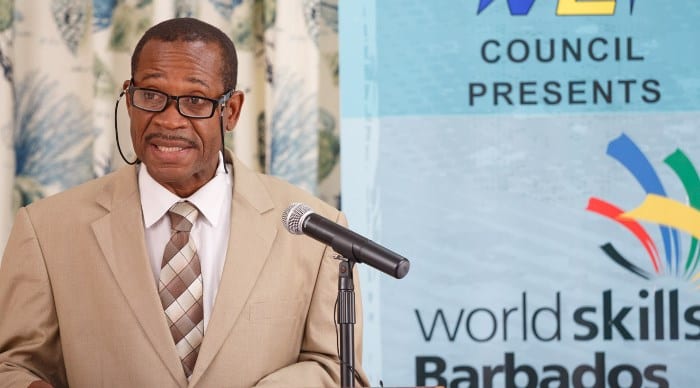
Executive Director of the Technical and Vocational Education and Training Council (TVET), Henderson Eastmond. (Photo courtesy of the TVET Council)
Executive Director of the Technical and Vocational Education and Training (TVET) Council, Henderson Eastmond, said his organisation will soon embark on a revision of the national technical and vocational education training policy.
He made this disclosure today while addressing World Skills Barbados presentation ceremony and media briefing at the Council’s Hastings House, Balmoral Gap, Christ Church, headquarters.
Mr. Eastmond told his audience that as the statutory body responsible for the TVET system, they will work with the relevant institutions to make it a reality.
He pointed out that government had expanded the sixth form programme to include non-traditional grammar schools, whose sixth form students will be pursuing CVQ Level 2 certification.
He further stated that the Caribbean Examinations Council was offering TVET subjects at the Caribbean Advanced Proficiency Education level.
The Executive Director also predicted that students leaving school over the next two to three years would be leaving school with CVQ Level 2 and CAPE TVET subjects.
“So, when they want to go further…we can work together to ensure that … Level 3 and 4 programmes are offered at [tertiary institutions], so that they can continue their TVET education. This type of education is needed for the resuscitation of the economy …,” Mr. Eastmond stated.
He also made a case for an upgrade of TVET trainers in vocational institutions. Mr. Eastmond contended that it was unacceptable for TVET teachers to be CVQ trained to Level 2 or 3, and then asked to deliver Level 2 or 3 programmes to students.
“…To teach in secondary schools, a degree is required. So, why are you going to ask your TVET teachers to be at Level 3 to teach Level 3? We are talking about the quality and relevance of education,” the TVET Council Executive Director pointed out.
Mr. Eastmond said the Council would develop a Bachelor of Education in Technological Education and Training for trainers and TVET teachers to enhance their CVQ status to Levels 4 or 5 and move the competency level training for students from Level 2 to 3.
Although Barbados did not medal in the competition in Abu Dhabi, Mr. Eastmond reasoned that the team’s performance could be attributed to a lack of up-to-date technology as well as unfamiliarity with it, and gaps in World Skills Standards and the training programmes locally.
In the Fashion Technology segment, Mr. Eastmond noted that competitors were required to drape, and pointed out that draping was not taught in the local fashion programme.
“We also picked up that other competitors were trained to Level 3 in the Caribbean Vocational Qualification with lots of competition experience. Most of our programmes are still at Level 2. If these competitors are Level 3 trained and going to many local competitions, that is why they move differently to how we move [when in competition],” he stated.
He also proffered the view, that countries such as Switzerland, Brazil and South Korea had policies to guide their TVET system, and suggested that Barbados followed suit.
“In 1965, Singapore was like us and they put out a policy that every child leaving school must pursue a TVET subject. Why can’t we agree [to stipulate this]?” he queried.
The World Skills Barbados experts, participants, team leader, technical and official delegates, as well as the official observer, Millicent Small, received certificates and World Skills branded pens.
The Minister of Labour, Senator Dr. Esther Byer Suckoo, also received the 2017 Youth Declaration on Future Skills & TVET document from Keanndra Marshall and Akel Bailey who participated in the Youth Forum at World Skills Barbados.
